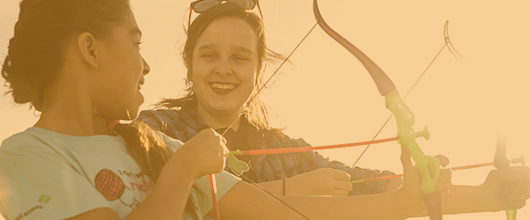


HEALTH, SAFETY & COMMON CONCERNS
It’s common for parents to have lots of questions about what their daughter’s life will be like while she’s with us at camp. Parents and caregivers are often worried about sending their girls to camp, especially for the first time. Here are some notes on health, safety, and common concerns we hear.
Contact our staff with any additional questions you have. We are here to support your girl and help her grow – Girl Scouts has over 100 years’ experience providing camp for girls!
Girls of all abilities–including those with disabilities and health concerns–are welcome and encouraged to register. Prior to registering, we recommend you contact us so we can make sure we are able to provide accommodations and adequate support for her camp experience. Our staff can also help you choose the sessions that are best fit for your girl.
Bathroom and shower facilities are located throughout the camp. Some housing requires an outdoor walk to the nearest location–remember to pack a flashlight. We will let you know the nearest bathroom and shower locations once you are at camp.
We strive to have girls shower at least every other day. Please help teach younger campers to shower or wash their own hair prior to arrival camp.Camp staff cannot assist with showers, and it should be noted there are no bathtubs.
If your camper is a bedwetter, you don’t have to worry, it is not an unusual concern. Please let us know on the Health History Form. Your camper should speak with her counselor or another staff person if she has an accident, and staff will discreetly launder the bedding and clothes.
Please let us know if your camper’s birthday occurs during her session. We want to recognize her special day! Let us know at the health check-in.
This summer, hundreds of girls will experience their first taste of independence at summer camp. For many, it will also be their first encounter with homesickness, but families don’t have to feel helpless. The best prescription is a simple solution of preparation and patience.
According to a study by Dr. Christopher Thurber, feeling homesick is a normal occurrence at camp. A whopping 83 percent of the campers studied reported homesickness on at least one day of camp. The American Camp Association (ACA) suggests the following tips for families to help their camper prepare for camp:
- Encourage independence throughout the year.
- Discuss what camp will be like before your camper leaves, such as using a flashlight to find the bathroom.
- Remind your camper ahead of time that you will not be able to contact each other via phone during your camper’s stay.
- Contact your camper by sending letters or care packages while she’s at camp.
- Pack a personal item from home, such as a stuffed animal.
Camp directors have extensive experience with homesickness. If you have a concern, voice it to our camp directors before camp, so the staff can provide the best experience for your camper. For many children, camp is a first step toward independence and plays an important role in their growth and development. Other resources for preparing for camp can be found at acacamps.org.
Girls and adults who have a communicable illness or medical emergency are not permitted to attend camp. If a girl or adult is unable to attend camp because of a communicable illness, their camp fees can be transferred to another camp session, at the same cost of the original camp registered for, if space is available. If another session cannot be determined, they will receive a full refund (minus the non-refundable deposit).
Please check your camper for lice before coming to camp. All overnight camp participants are screened for lice upon arrival at camp. Any individual found to have lice will be required to leave camp. Individuals are allowed to return to camp after 24 hours if they are found to be lice-free. There are no partial refunds for days missed. If an individual is unable to attend camp because of lice, their registration may be transferred to another applicable camp session if one is available. No refunds will be issued if another session cannot be determined.
Day Camp
Parent/guardians are responsible for turning in their campers’ medication(s). Medications should be turned into the Camp Staff during check in on Monday with the instructions. Medication will be in a locked area with the camp staff at all times. It will only be given to camper based on the instructions.
Resident Camps
Our health staff will make sure that campers have access to their medications when necessary during their stay. Take note of how to pack medications on our Packing Tips page.
Insect bites are a risk with any outdoor activity in the Midwest, and camping is no exception. We take precautions to decrease the chance for insect bites among our campers, and there are additional steps that parents can take as well.
Our Precautions
- Our counselors and staff are diligent about reminding campers to put on insect repellent.
- Maintenance staff works to eliminate any man-made standing water, which can attract mosquitos.
- Hiking trails are trimmed regularly.
Beyond the annoyance and itchiness mosquito bites can cause, we are aware of concerns regarding Zika. Zika, a disease caused by the Zika virus, is spread to people primarily through the bite of an infected Aedes species mosquito. The most common symptoms of Zika are fever, rash, joint pain, and conjunctivitis (red eyes). The illness is usually mild with symptoms lasting for several days to a week after being bitten by an infected mosquito. Learn more here: cdc.gov/zika/about/index
Mosquito Bite Prevention Steps for Parents and Guardians
As you prepare your camper for her stay with us, be sure to include the following items from our packing lists that will help prevent mosquito and other insect bites:
- A bandana or hat to cover her head on hikes
- Insect repellant containing DEET
- Long pants, since they act as an added barrier
In addition, you may consider sending clothing treated with permethrin, an insect repellant. You can find this insect repelling clothing at most sporting goods stores.
The CDC has a helpful, downloadable guide to mosquito bite prevention: cdc.gov/chikungunya/pdfs/fs_mosquito_bite_prevention_us.pdf
For more information about the Zika virus, go to: cdc.gov/zika/
Notify our camp directors if your camper has specific health needs (e.g. injections, specialized equipment). If a girl has dietary needs beyond vegetarian, our cooks can provide gluten-free, dairy-free, peanut-free and treenut-free meals and accommodate other allergies. We can accommodate other allergies, as well, if given enough notice.
Notifications should be submitted at least two weeks prior to the camp session your girl will be attending. Notifications should also be included on the camper’s health history form.
GSWESTOK staff may not receive or accept tips, gifts, or gratuity, monetary or otherwise. To thank staff for a job well done or to provide funds for all girls to go to camp, please consider a donation.
Ticks are a risk with any outdoor activity in the Midwest, and camping is no exception. We take precautions to mitigate tick risk among our campers, and there are additional steps that parents can take as well.
Our Precautions
- We keep trails trimmed and wide enough for easy passage since ticks are often picked up from brush.
- Our counselors remind girls to perform tick checks, and our health staff are trained to properly remove any that are found. Ticks will be sent home with the camper in a baggie with information in case she develops symptoms of a tick-borne illness.
Tick Prevention Steps for Parents and Guardians
As you prepare your camper for her stay with us, be sure to include the following items from our packing lists that will help prevent tick and other insect bites:
- A bandana or hat to cover her head on hikes
- Insect repellant containing DEET
- Long pants, since they act as a tick barrier
In addition, you may consider sending clothing treated with permethrin, an insect repellant. You can find this insect repelling clothing at most sporting goods stores.
After she returns from camp, remind her to continue the tick checks she learned at a camp for a few extra days. Centers for Disease Control (CDC)provide good information that you can use to learn how to do tick checks, remove any ticks you or your family finds, and to watch for symptoms of Lyme Disease.
Each camp has a store or “trading post,” and all campers will get a chance to shop during their stay at camp. The trading post will be open on check-out days, and will accept cash or card at those times. The camp store will also be open periodically
throughout the week for girls to spend the money on their trading post account.
At no point can staff accept cash or card from girls when their parent/guardian is not present.
If you wish to add money to your campers’ trading post account, this can be done online through registration or by going into the Council Office.
All campers participate in a swimming skills assessment as one of the first activities at camp. This ensures your camper is safe and ready for swim time. Campers will be assigned to swim areas according to their swimming ability. If campers are not comfortable in the water at all or in taking the swim skill assessment, please alert the staff when dropping off your camper.
Everyone is required to wear a life jacket in all boats, regardless of swimming ability. All aquatic activities are supervised by certified lifeguards.
A Girl Scout is always prepared, and that includes at camp. During training, staff will learn and practice emergency weather procedures and emergency action plans. Each opening day, campers also learn the information and will have practice drills during their time at camp. If the weather is unusually hot or cold, activities are changed to keep campers safe. Weather alert radios are monitored, and there are designated storm shelters for each camp.
Please remember, during weather alerts, phone lines need to remain open to contact different parts of camp or emergency services; please do not call during severe weather.
